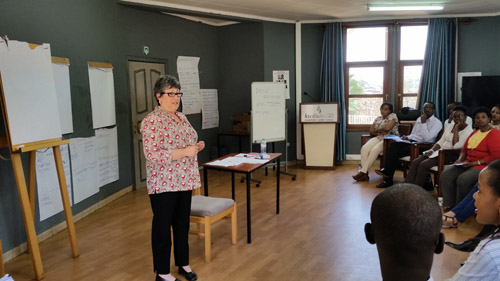USC’s Beth Meyerowitz and USC Shoah Foundation Host Trauma Education Workshop at Kigali Genocide Memorial


For those who work in the field of genocide memorialization and genocide education, a typical workday can include learning about disturbing subject matter and interacting with people who suffered extreme trauma in their lives. To help combat the stresses of working with genocide, USC Shoah Foundation hosted a Trauma Education workshop for Aegis Trust and Kigali Genocide Memorial staff in Rwanda last week.
The workshop was led by Dr. Beth Meyerowitz, USC professor of psychology. Professor Meyerowitz has studied trauma and resilience among survivors of the 1994 Rwanda Tutsi Genocide and taught courses utilizing the Visual History Archive. USC Shoah Foundation director of research and documentation Karen Jungblut and program assistant Edith Umugiraneza also attended and helped facilitate the workshop.
The workshop was held at Kigali Genocide Memorial July 29-31. It was attended by about 35 staff who work across KGM, Aegis Trust and the Kwibuka20 commemoration.
The goal of the workshop was to help colleagues who work with the topic of genocide on a day-to-day basis to explore and understand the impact of that work in their professional and personal contexts, and to explore ways to cope and ease stress for the themselves as well as for the people with whom they interact as part of their work.
Before the workshop began, attendees provided feedback about what they hoped to achieve from the three days. They said they wanted to learn about recognizing the signs of trauma, how to help others who are traumatized, learn to manage stress, and learn techniques that will help them to accomplish their work in a challenging and stressful environment.
The first day, Professor Meyerowitz discussed the causes and symptoms of trauma and PTSD, different types of trauma, recognizing triggers and the impact of traumatic experiences on the body and mind. The next day, participants worked in groups to discuss various topics – courage, agency, calmness, finding joy, etc. – and what they mean in the context of the work, and then came together to discuss findings and offer feedback. The workshop concluded with a debrief and opportunity to discuss next steps and recommendations.
Asked what the most important thing they learned was, participants said they learned how important it is to take care of themselves and others if they have symptoms of a form of trauma. Many were also interested to learn that these conditions are manageable with different techniques. They were inspired to do things outside of work to help them unwind from the stresses of their jobs, such as play a musical instrument or spend time with friends.
The Trauma Education Workshop was received very well by the participants. Many said that Professor Meyerowtiz’s engaging presentation style was one of the highlights of the workshop, and they thought such a workshop would be beneficial for other colleagues and friends who work in their field.